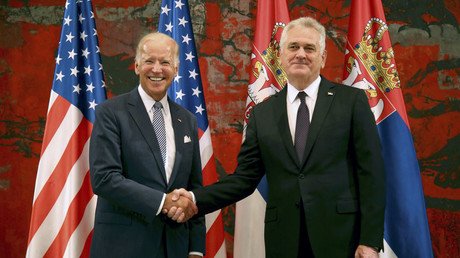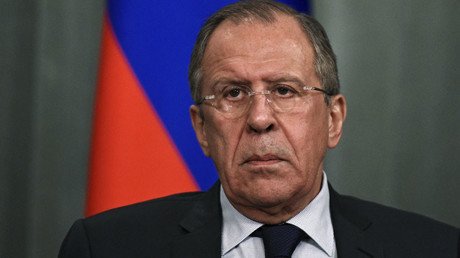Washington Post thinks Russian radio, not NATO bombing, turned Serbs against the Alliance

The Washington Post expects its readers to believe Serbia’s lack of enthusiasm for NATO membership is because of “Russian disinformation.” Naturally, it has nothing to do with the “defensive alliance” bombing the country seventeen years ago.
Sometimes you read something in a newspaper and it just makes you laugh. Previously, that impulse was reserved for tabloids like Germany’s Bild or Britain’s Sun, or more outlandish American stuff such as the National Enquirer or The Weekly World News. You know the type of content: “Elvis’ Tomb is Empty” or “Al-Qaeda Threatens to Bomb Coronation Street Set.”
All obvious nonsense, but amusing and harmless stuff from outlets with zero credibility in the first place.
Increasingly, I’m finding established broadsheets comical too, but in this instance it isn’t really funny. While everybody knows the yellow press is full of scarcely researched tittle-tattle, we expect better from the Western establishment’s so-called serious media. Sadly, in recent times, especially while riding the wave of Russia scare stories, their content has become more and more factually challenged and increasingly lazy.
A case in point is last week’s Washington Post. It's worth clarifying at the outset that today’s “WaPo” cannot be compared to the title of ‘Watergate,’ which was once considered America’s finest paper. The current product is the not the Graham-era beast which specialized in investigative reporting.
Instead of giving free rein to tigers like Ben Bradlee, Bob Woodward and Carl Bernstein, it’s more of a views-paper, with columnists pushing a pro-liberal interventionist line on foreign policy and a neoliberal economic agenda domestically. Indeed, the fact that WaPo’s main writer on Russian affairs is a paid lobbyist for US defense contractors makes it something of a laughing stock among genuine Russia experts.
Reality And The Post
However, on this occasion, WaPo has really excelled itself. Continuing the theme where Russian “disinformation” or “meddling” is responsible for every problem afflicting American foreign policy, it attempts to suggest how the influence of Russian broadcasters is the main reason why Serbia doesn’t wish to join NATO. Now, just repeat that sentence twice and let it sink in for a moment.
Pretty much anybody over thirty will remember the events of 1999, when the American-led military organization launched a 78-day bombing campaign against the country. Serbia claims 956 people were killed and 5,173 wounded during the bombardment, and even US-based Human Rights Watch estimates around 500 deaths. In addition, Belgrade contends that NATO caused economic damage of about $100 billion, while a group of international economists preferred a $29.6 billion figure. For a relatively poor country, these numbers when compared to overall GDP are humongous.
Furthermore, in the aftermath of the conflict Serbia, already shorn of Yugoslav territories it effectively controlled, lost jurisdiction over Kosovo and Montenegro. These issues are seen as a national humiliation, even today.
No matter which way you look at it, the damage wrought on Serbia by NATO was huge. And given how these events took place less than one generation ago, it’s pretty obvious that Serbs have legitimate reasons for not being hugely positive about the alliance. However, none of this matters much to WaPo, which has its “Russian propaganda” narrative to push, and doesn’t let facts get in its way.
Fragile Fact Checking
In a column headlined, “Russia has a years-long plot to influence Balkan politics. The US can learn a lot from it,” the writer, Jaroslaw Wisniewski, insists Moscow has been operating a sort of communications laboratory in the Balkans, to test methods before deploying them in the US. And from there, the piece gets ever more fantastical and delusional. For example, he insists that “Russians feel strongly that to be a great power, the nation must be involved and present in the Balkans.” Trust me, I have lived for most of the past six years in Russia, and never heard a single Russian mention this. Indeed, their Balkan thoughts are usually confined to beaches in Montenegro, Greece and Croatia.
On the other hand, it is true to suggest that many Russians regard Serbs as a ‘brotherly’ nation, due to a shared religion and similar Slavic roots. But they also once harbored comparable sentiments toward Ukraine and would feel roughly the same about Bulgaria, Belarus and even Orthodox Greece, two of which are already signed-up to the Atlantic military club.
Wisniewski goes on to claim how “Russia’s propaganda campaign is highly-focused, targeting the generally Serbian speaking Slavic-Orthodox communities within the Balkans. The main tool of Russia’s information policy is the television network and internet portal RT and the online news and radio broadcast service Sputnik Srbija.” And it’s here where his already weak and lazy argument finally dies on its feet.
The Real World
You see, I was pretty doubtful that RT has a Serbian service, because I have been to Serbia and didn't notice any presence. So, I checked this very website, and RT's TV listings, and there is nothing in the language at all, thus torpedoing WaPo’s nefarious Serbian messaging hypothesis almost in its entirety. That said, Sputnik Radio does have a Serbian page.
Now, if you’ve spent time in Belgrade, you’ll know Serbs aren’t really fantastic at the English, so attempting to reach them in this tongue is inherently futile. I also didn’t hear much German, French, Arabic or Spanish spoke there, the other languages RT is available in. With this in mind, the only rational conclusion here is that Russia does not have a highly sophisticated or focused ‘propaganda’ campaign in the Balkans.
Also, frankly, if it’s true that Sputnik is “refer(ing) to the shared Slav history and culture” between Russian and Serbian folk, I don't see what is contentious here. After all, I grew up watching BBC, which never stops ranting about the “special relationship,” between Britain and America, presumably, also based on a “shared (Anglo-Saxon) history and culture.”
Put simply, the whole premise of WaPo’s latest “scary Russians” article is based on falsehoods and exaggerations. So, while the entire angle has become increasingly boring and tiresome, this example is just ridiculous.
A better WaPo headline would be: “Military Club That Bombarded Country 17 Years Ago Blames Radio Station For Its Lack Of Popularity There.” Because the simple fact is that Russia never bombed Serbia and NATO did. And no amount of "propaganda” can change that.
The statements, views and opinions expressed in this column are solely those of the author and do not necessarily represent those of RT.
















